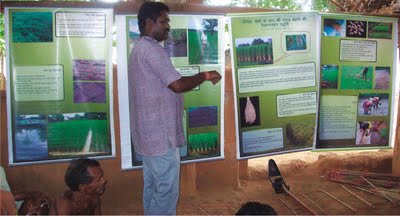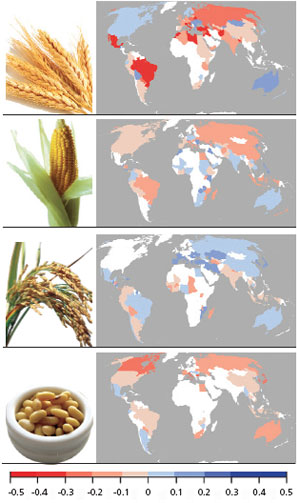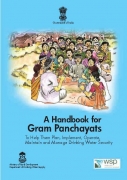/regions/political
Political
Introducing a new farming technique (SRI) in the Gangetic plains,Bihar
Posted on 28 Jul, 2011 03:19 PMArticle and Image courtesy: BodhiCommons
Farmers groups conserve traditional rice varieties in Bastar region of Chhattisgarh
Posted on 28 Jul, 2011 03:17 PM Chhattisgarh is traditionally known as the Rice Bowl of India. Over 20,000 rice varieties have been recorded in the region. These are a result of centuries of rice farming by indigenous communities through selection and adaptation to a variety of soil, water and micro-ecosystems conditions including predators.
Chhattisgarh is traditionally known as the Rice Bowl of India. Over 20,000 rice varieties have been recorded in the region. These are a result of centuries of rice farming by indigenous communities through selection and adaptation to a variety of soil, water and micro-ecosystems conditions including predators.
Today these varieties are being lost with market forces promoting so called high-yielding varieties and synthetic fertilizer and pesticide-based agriculture that focuses only on yield, as well as the general but incorrect perception of traditional varieties as low yielding. There has also been tremendous loss of traditional knowledge associated with traditional agro-ecosystems and production practices.
Climate change hits food production
Posted on 28 Jul, 2011 03:10 PMArticle and Image courtesy: Down To Earth
Author: Indu Mathi S
Global warming has resulted in 20 per cent increase in price of wheat, maize, rice and soybean.
 Estimated impact of climate change on crop production during 1980-2008. Negative values indicate climate change reduced yields
Estimated impact of climate change on crop production during 1980-2008. Negative values indicate climate change reduced yields
There have been many indicators that global warming could be hurting the world food production, lowering yields and increasing prices. Turns out the warming of the planet over the past three decades has already led to a measurable reduction in crop production of wheat and maize.
Economic and Political Weekly 2011: Review of Agriculture (June 25 - July 8, 2011)
Posted on 28 Jul, 2011 02:25 PM
Issue: VOL 46 No. 26 and 27 Jun 25 - July 08, 2011
Review of Agriculture
Irrigation in Telangana: The Rise and Fall of Tanks
Gautam Pingle
Training program on ‘Domestic wastewater treatment & reuse’, Centre for Science and Environment, September 28 – October 1, 2011, New Delhi
Posted on 28 Jul, 2011 02:24 PMOrganizer: Centre for Science and Environment
Venue: Anil Agarwal Green College, Centre for Science and Environment 38, Tughlakabad Institutional Area, (Near Batra Hospital), New Delhi
Plastic Waste (Management and Handling) Rules (2011)
Posted on 28 Jul, 2011 08:21 AMThis document on the Ministry of Environment and Forests site includes the Plastic Waste (Management and Handling) Rules replaces the earlier Recycled Plastics Manufacture and Usage Rules,1999 (amended in 2003).
Managing drinking water security - A handbook for Gram Panchayats by the Department of Drinking Water Supply (MoRD)
Posted on 27 Jul, 2011 10:03 PM This handbook for Gram Panchayats has been prepared by the Water and Sanitation Program (World Bank) for the Department of Drinking Water Supply, Ministry of Rural Development, Government of India.
This handbook for Gram Panchayats has been prepared by the Water and Sanitation Program (World Bank) for the Department of Drinking Water Supply, Ministry of Rural Development, Government of India.
The Department of Drinking Water Supply (DDWS) launched the National Rural Drinking Water Program (NRDWP) in April, 2009. The NRDWP builds on experiences gained through past efforts by many stakeholders and brings all existing rural drinking water initiatives under a single program. The focus of the NRDWP is to ensure drinking water security for all rural citizens in India. Drinking water security means providing every rural person with enough safe water for drinking, cooking and other domestic needs at all times and in all situations, including periods of drought and flood and for livestock.
A kalyani brought to life in Mulbagal, Karnataka: An Arghyam initiative
Posted on 27 Jul, 2011 05:58 PMGuest post by Manjunath Prasad
The sector programme and climate change initiatives in Uttarakhand
Posted on 27 Jul, 2011 02:54 PMRecent scientific studies show that global warming is already causing environmental changes that will have significant global economic and social impacts. As the world's 4th largest emitter of greenhouse gases, India has to juggle the imperative demand for economic development with pressures for greater efficiency in the use of energy.
Climate change is a change in the statistical properties of the climate system when considered over long periods of time, regardless of cause. Climate change reflects a change in the energy balance of the climate system, i.e. changes the relative balance between incoming solar radiation and outgoing infrared radiation from Earth. The threat emanates from accumulated green house gas emissions in the atmosphere, generated through long term and intensive industrial growth and high consumption life styles of developed countries.
Third Sector Partners invites applications for executive director, Mercy Corps India at Delhi – Apply by August 12, 2011
Posted on 27 Jul, 2011 01:36 PMThird Sector Partners, a leading CxO and board search firm in the Not for Profit sector, has been retained by Mercy Corps to hire its Executive Director, India.
Mercy Corps is seeking a bold, action-oriented, and creative leader with a passion for social entrepreneurship to be its Executive Director (ED) for Mercy Corps India (MCI). MCI is a member of the global Mercy Corps family, but is registered as an independent Section 25 company with a separate Board of Directors. The ED must therefore be a shrewd navigator, able to steer our country presence along a truly “local to global” axis as an independent entity, while at the same time maintaining close links to the ethos and administrative structures of the parent company, Mercy Corps.